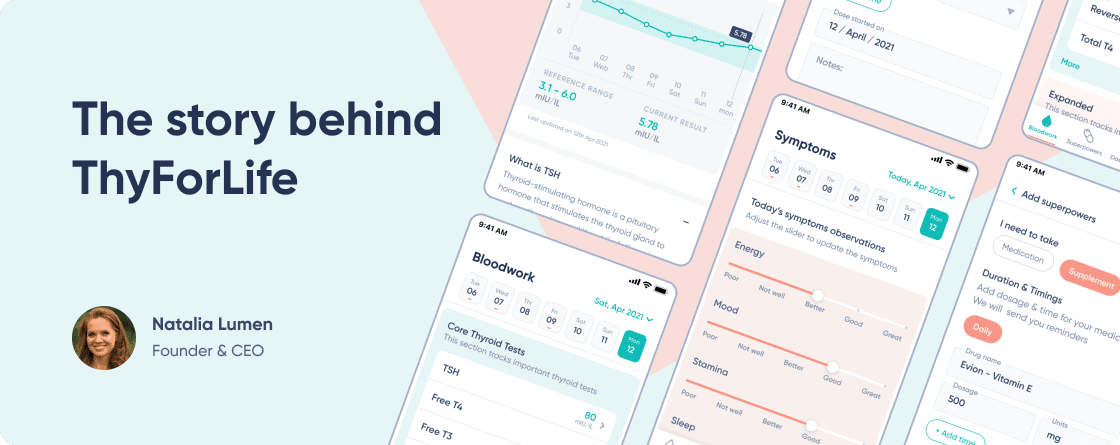In today’s fast-paced, technology-driven world, the impact of modern advancements extends beyond just smartphones and smart homes. As technology rapidly evolves, it affects essentially all aspects of our lives, including thyroid health.
Millions around the world live with thyroid conditions such as hypothyroidism (underactive thyroid), hyperthyroidism (overactive thyroid), and thyroid cancer. Scientific research over the past years has led to improvements in the management of these conditions. We are currently seeing innovative technologies now more than ever making a significant impact in cardiovascular healthcare. As a health tech company, ThyForLife Health is particularly interested in leveraging technology to develop innovative solutions that empower individuals around the world in their thyroid health journeys.
In this article, we will discuss some exciting technological advancements that are shaping the present and future of thyroid healthcare. We will also briefly recount the ThyForLife story and mission.
What are some emerging technologies of relevance in thyroid healthcare today?
In a previous blog article, we discussed the current and potential applications of artificial intelligence in thyroid healthcare. However, the impact of technological advancements on thyroid healthcare is not limited to only AI.
Below, we briefly discuss some technological tools that have improved or have the potential to improve thyroid healthcare.
1. Wearable devices
Wearable technology has become increasingly popular for monitoring various health metrics. Smartwatches and fitness trackers equipped with sensors can track vital signs, including body temperature, sleep patterns, and heart rate. Imagine the exciting possibility of waking up to personalized insights about your thyroid function.
Findings from a study published in the Endocrinology and Metabolism journal in 2021 showed that using a wearable device to track heart rate changes can predict thyroid function in hypothyroid patients. This was based on the observed correlation between heart rate as measured by wearable devices and free thyroxine (FT4) concentrations in patients with hypothyroidism. The researchers also suggested that this approach might also work for other thyroid conditions like thyrotoxicosis (overactive thyroid).
Interestingly, in an article published in Scientific Reports in November 2023, researchers demonstrated how they used artificial intelligence, specifically machine learning, to develop a system that can predict thyrotoxicosis and monitor thyroid function in individuals with thyroid problems based on their heart rate data which have been collected from their wearable devices.
2. 3D printing to facilitate thyroid surgery
Currently, 3D printing is being explored for its utility in thyroid surgeries, particularly for the purpose of preoperative evaluations. Although this technology is not yet fully developed, the goal is to equip doctors with 3D-printed models created from a patient’s CT scan. These models show the exact anatomy of the thyroid gland, including its size, location, and relationship with surrounding structures like nerves and blood vessels. This helps surgeons plan the surgery more precisely and anticipate potential challenges to reduce risks during the actual surgery. These models can also facilitate the discussion of the surgical procedure with the patient, and as a result, improve the patient’s understanding and satisfaction with the informed consent process.
3. Telemedicine
Telemedicine is the use of technology to deliver healthcare services remotely, typically through video conferencing or other forms of electronic communication. Although telehealth is a broader term that encompasses telemedicine, sometimes both terms are used interchangeably.
Virtual consultations with healthcare providers are becoming increasingly popular. This can be a game-changer for individuals with busy schedules or those living in remote areas, allowing them to discuss their thyroid concerns and receive guidance from the comfort of their homes.
In a review article published in the Primary Care journal in 2022, the author points out how before the COVID-19 pandemic, telemedicine wasn’t widely used or studied due to regulations and limitations on payment. However, the pandemic led to looser regulations and equal insurance coverage (for both in-person and telemedicine appointments), causing a surge in the use of telemedicine.
While telemedicine doesn’t entirely eliminate the need for in-person visits, it offers significant benefits in managing thyroid health between those visits. This convenience is beneficial as it enables regular check-ins and adjustments to treatment plans without the need for frequent in-person hospital visits.
4. Mobile apps
Are you tired of juggling medication reminders and appointments? With the advent of mobile apps for people with thyroid conditions, you can now have a trusted companion to help ensure that you do not miss any medication dose again. These apps typically offer reminders for medication intake and symptom tracking. Now, you might be wondering which app to choose as your “thyroid health companion.” Don’t worry. We’ve got you covered.
The ThyForLife app is more than just a medication management app. Among the many benefits of using the ThyForLife app is the access to educational resources in the form of medically-reviewed articles covering a wide range of topics from lifestyle to latest research. ThyForLife also offers an anonymous global community where individuals with all types of thyroid conditions can share experiences, tips, and information. Participating in this online global community can provide valuable insights, emotional support, and a sense of belonging to those navigating the challenges of managing one’s thyroid health.
The ThyForLife story
In 2021, ThyForLife Health was founded by Natalia Lumen. However, the drive behind this initiative was sparked much earlier, dating back to a few years before the launch of the ThyForLife app on April 20, 2021.
In 2017, Natalia was diagnosed with papillary thyroid cancer during a routine health check. Her career as a management consultant at Bain & Company at the time took a sudden turn when she received this unexpected diagnosis. While her recovery from surgery was challenging, the long-term management of the post-thyroidectomy hypothyroidism proved even more demanding.
After experiencing challenges with managing her medication and blood test results, Natalia sought to find a solution to this problem. In the process, she learned that many people with thyroid conditions also struggle to track their health data and connect with others who understand their condition. Some of the people Natalia had interacted with shared with her how they had to resort to various methods, from paper notes to email archives, and even DIY Excel spreadsheets to manage their test results. As a result, the ThyForLife mobile app was created to provide a solution to this common problem faced by people living with various types of thyroid conditions.
For people living with thyroid conditions such as hypothyroidism (the most common thyroid condition) which requires having to take daily medication for the rest of their lives, having a digital tool that makes this much easier is such a big deal. This is especially relevant when thyroid medication guidelines are taken into consideration. For those who have been newly diagnosed, it may take a while to get used to some of these guidelines.
Not only does ThyForLife help users track their medication, blood work, and weight, but it also allows users to normalize blood test results from different labs onto a single scale. Having lived in and traveled across various countries, Natalia faced the challenge of comparing blood test results due to differing units (pmol/L vs. ng/dL) and reference ranges used in different healthcare systems. The ThyForLife app addresses this problem.
In 2018, Natalia attended a Thyroid Cancer Survivors’ Conference (ThyCa) in Chicago, where she appreciated the importance of community for individuals facing similar health challenges. Driven by the obvious positive impact of a supportive community on thyroid patients’ mental well-being, Natalia set out to build a community with ThyForLife. This community would extend beyond just cancer patients to encompass individuals facing chronic conditions who would benefit from a sense of belonging and connection. Today, the ThyForLife app is the only all-in-one global community platform and tracking app that provides support for all thyroid conditions and offers the opportunity to anonymously connect with other members of the thyroid community.
Having once found herself in an uncomfortable situation where she had received conflicting advice from different doctors regarding the best course of action for her condition, it became very clear to Natalia that ThyForLife should be aimed at empowering thyroid patients with their own health data. At ThyForLife Health, we believe that taking ownership of your information allows you to participate actively in your healthcare journey and make informed decisions alongside your doctors. After all, health management is a collaborative effort between patient and doctor, requiring both informed participation and professional guidance.
Our progress and the overall success we have chalked up thus far are mostly thanks to the hardworking ThyForLife team. We are proud to have had talented team members from all across the globe over the years. We are also fortunate to have a strong advisory board with members of diverse backgrounds. Our success is also in part due to the continued support from our users, our number one priority. Our goal is to widen our reach over time to the millions of people around the world living with thyroid disorders. In January 2023, the ThyForLife app was launched in 13 languages, increasing its global accessibility.
We have many exciting plans for the future, and we can’t wait to share them with you. The ThyForLife team is constantly working on providing an improved user experience as well as new features to be rolled out in the near future. One of our plans for the future is to help our users access telehealth consultations.
Thank you for making ThyForLife a part of your thyroid health journey!
The ThyForLife mobile app is currently available for free download on Android and iOS.
Key takeaways
- As technology continues to advance, the future holds promising possibilities for more personalized and effective thyroid care.
- Mobile apps such as ThyForLife have transformed how patients track their medications, symptoms, and blood work results, fostering self-management and informed decision-making.
- Telehealth brings thyroid healthcare closer to everyone, enabling remote consultations with doctors and specialists, reducing geographical barriers.
- With advancements in healthcare technology, the power of data can be more easily harnessed to personalize treatment plans, predict potential risks, and optimize health outcomes.
- Technology has also facilitated community building among people living with thyroid conditions through online/virtual communities.
- Natalia Lumen, the founder and CEO of ThyForLife, is a thyroid cancer survivor who created the ThyForLife app to help thyroid patients manage their thyroid health.
- By leveraging technology, ThyForLife Health aims to empower thyroid patients to take charge of their thyroid health.



